|
|
|
Sort Order |
|
|
|
Items / Page
|
|
|
|
|
|
|
| Srl | Item |
| 1 |
ID:
130278


|
|
|
|
|
| Publication |
2013.
|
| Summary/Abstract |
The nuclear nonproliferation regime is a great example of the success of post-war liberal internationalism: despite a spread of potential technological capabilities, only nine countries possess nuclear weapons. The nonproliferation regime has somewhat facilitated international cooperation on the peaceful use of nuclear energy by reducing threats and the risk of proliferation. It has also contributed to the security of states as well as regions by preventing the possession of nuclear weapons of neighboring countries. Under such a relatively stable environment, the post-war liberal international order has assisted the emergence of new powers, such as Japan and Germany, but also provided ground for the rise of a potential strategic rivalry, seen with China.
But now this liberal international order, in particular the nuclear order, is under challenge. While the norm of nonproliferation and the legitimacy of the nuclear Non-Proliferation Treaty (NPT) have each gained universal support, adherence to the Treaty is not automatic. This simple fact becomes more complicated as the nonproliferation regime faces rather prolonged, unresolved North Korean and Iranian proliferation challenges. If these proliferation problems remain unsolved, and states like Iran and North Korea enjoy the status of being nuclear-armed states, other states might be disincentivized from adhering to the nonproliferation regime.
|
|
|
|
|
|
|
|
|
|
|
|
|
|
|
|
| 2 |
ID:
130279
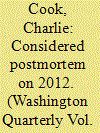

|
|
|
|
|
| Publication |
2013.
|
| Summary/Abstract |
The November 2012 election results revealed and underscored greater changes in American political dynamics than many of us had anticipated. Republicans, who had won the popular vote in four out of the five presidential elections from 1968-1988, have now lost five out of the last six, with 2000 notably featuring a Democratic popular vote win but George W. Bush capturing the Electoral College. Republicans last won 300 or more electoral votes in 1988; Democrats have now exceeded 300 in four of the last six elections, from 1992-2012. Keeping in mind that 270 electoral votes are needed to win, Democrats have now carried 18 states plus the District of Columbia in six consecutive elections, a combination totaling 242 electoral votes-89 percent of the 270 needed to win an election. One can now say that Democrats have a home field advantage in presidential races.
|
|
|
|
|
|
|
|
|
|
|
|
|
|
|
|
| 3 |
ID:
130270
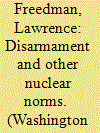

|
|
|
|
|
| Publication |
2013.
|
| Summary/Abstract |
Once the Cold War ended, and with it the prospect of a cataclysmic Third World War, many argued that the nuclear arsenals accumulated during its 45 years were anachronistic and redundant. By the mid-1990s, calls for their complete elimination had gained notable adherents.1 Yet, while elements of these arsenals were removed without much difficulty, their size and destructive power remained substantial and the disarmament movement soon flagged. It took about a decade for it to revive, when in 2007 a surprising group of senior American statesmen refreshed the process.2 Organizations such as Global Zero, which has attracted high-profile support,3 and various international commissions4 echoed their call for a world free of nuclear weapons. This issue impressed itself sufficiently on Barack Obama that he made it the subject of one of his first speeches as President, when he spoke in Prague in April 2009 and committed the United States to the goal of complete nuclear disarmament.
|
|
|
|
|
|
|
|
|
|
|
|
|
|
|
|
| 4 |
ID:
130261
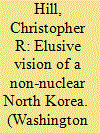

|
|
|
|
|
| Publication |
2013.
|
| Summary/Abstract |
Any president1 at the start of a new term will survey international problems and find a few requiring urgent attention. Some will be new, perhaps even emerging after the 2012 political campaign, but others are like hardy perennials, returning year after year. In 2013, one of these problems is North Korea and its aspirations to be a nuclear weapons state. The longer the problem of North Korea's nuclear issue remains, the more the world becomes inured to it, and might become inclined to live with it. North Korea's ambition to develop nuclear weapons, however, is a threat to peace and security-especially in the region. If successful in developing a deliverable nuclear weapons system (i.e. miniaturized and integrated with a working missile), North Korea would make a mockery of the already struggling nuclear Non-proliferation Treaty (NPT), as well as invite a regional arms race.
|
|
|
|
|
|
|
|
|
|
|
|
|
|
|
|
| 5 |
ID:
130268
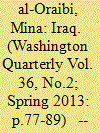

|
|
|
|
|
| Publication |
2013.
|
| Summary/Abstract |
Spring 2013 contains a bittersweet anniversary for most Iraqis. Although it marks ten years since the war that removed Saddam Hussein from power and ended his bloody rule, it also signifies the beginning of years of violence and instability. The war itself has various names and descriptions: some call it an "invasion," others a "liberation," each depending on their political leanings and convictions. A significant number of Iraqis at first believed it was indeed a war of liberation but later turned to calling it an "occupation" as the situation further deteriorated. Even the U.S. Army changed the name of the war: from 2003-2009 it was Operation Iraqi Freedom, but in September 2010 it was renamed Operation New Dawn to reflect efforts by U.S. and Iraqi politicians to end one stage of the war and move toward withdrawal of U.S. troops. Known to many simply as the 2003 War, its ramifications are still felt in every aspect of Iraq's existence today.
|
|
|
|
|
|
|
|
|
|
|
|
|
|
|
|
| 6 |
ID:
130273


|
|
|
|
|
| Publication |
2013.
|
| Summary/Abstract |
The Prague Agenda outlined by the U.S. President Barack Obama four years ago appears marginal at best to the emerging nonproliferation challenges. This is especially true in the world's most important strategic theaters-East Asia and the Middle East. Obama's speech was indeed an inflection point in the U.S. foreign policy debate on nuclear disarmament and nonproliferation.
At its heart, the debate is about the nature and relevance of the arms control framework that emerged in the late 1960s and reached its apogee in the 1970s. This framework mainly aimed at stabilizing the nuclear relationship between the two superpowers-the United States and the Soviet Union-by laying down mutually acceptable rules of nuclear deterrence and regulating their competition. It also had a regional focus in managing the atomic dynamic in post-War Europe by getting most advanced European nations, especially the divided Germany, to renounce the nuclear weapon option. In Asia, the main regional focus was convincing Japan to accept a non-nuclear weapons status.
|
|
|
|
|
|
|
|
|
|
|
|
|
|
|
|
| 7 |
ID:
130267
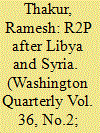

|
|
|
|
|
| Publication |
2013.
|
| Summary/Abstract |
The use of force-no matter how benevolent, enlightened, or impartial in intent-has dramatic consequences. It shapes the struggle for power and helps to determine the outcome of political contests, which is why it is inherently controversial. It is why international debates about Libya-the first road test of the Responsibility to Protect's (R2P) coercive element (also known as Pillar Three)-were understandably contentious. Pillar Three is defined as "the responsibility of Member States to respond collectively in a timely and decisive manner when a State is manifestly failing to provide?…?protection."1 While peaceful means of response are primarily preferred, should that prove inadequate to ensure protection, the international community should use more robust action: "no strategy for fulfilling the responsibility to protect would be complete without the possibility of collective enforcement measures, including through sanctions or coercive military action in extreme cases.
|
|
|
|
|
|
|
|
|
|
|
|
|
|
|
|
| 8 |
ID:
130262


|
|
|
|
|
| Publication |
2013.
|
| Summary/Abstract |
As President Obama enters his second term, continuing to shift U.S. attention and resources to the Asia-Pacific will be a leading U.S. foreign policy priority. While many in the region have welcomed this renewed commitment, the U.S. "pivot" to Asia has created heightened concerns in China about U.S. intentions.1 U.S. efforts to expand its military force posture in Asia, to strengthen security ties with allies and partners, and to enhance the role of regional institutions are viewed by many in Beijing as directly aimed at constraining China's rise and as the principal cause of regional instability as well as the deterioration of China's strategic environment.
|
|
|
|
|
|
|
|
|
|
|
|
|
|
|
|
| 9 |
ID:
130274


|
|
|
|
|
| Publication |
2013.
|
| Summary/Abstract |
Since President Obama delivered his Prague speech four years ago, the prospects for nuclear disarmament and nonproliferation have actually not become more straightforward. This is partly due to the current state of international relations. Financial and fiscal frustration has beleaguered both the United States and the European Union (EU), and global economic growth has widely slowed. With China becoming more confident and the second-biggest economic entity in 2010, the distrust between Washington and Beijing continues to rise. Tensions over the past years concerning the change of regimes in West Asia and North Africa, the so called "Arabic Spring," as well as the U.S. "rebalancing" in East Asia further strain international relations. U.S.-Russia relations also suffer. Although the two countries brokered the new START Treaty of 2010, momentum has slowed on establishing deeper nuclear cuts. Given their different positions over the recent turbulence in Libya and the ongoing conflict in Syria, it is improbable that the United States and Russia could strategically "reset" relations to move down the road of nuclear disarmament.
|
|
|
|
|
|
|
|
|
|
|
|
|
|
|
|
| 10 |
ID:
130265
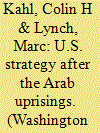

|
|
|
|
|
| Publication |
2013.
|
| Summary/Abstract |
Two years into the wave of upheaval sweeping the Arab world, new regional dynamics have become clearer, as have unresolved tensions in current U.S. policy toward the region. Given the scale and velocity of political turmoil associated with the Arab uprisings, the Obama administration has understandably adopted a largely reactive approach, attempting to adjust U.S. policies to a rapidly changing environment. It has been more successful in those efforts than is commonly recognized, maintaining effective pressure against Iran and al-Qaeda while helping to broker meaningful political transitions in Tunisia, Egypt, Yemen, and Libya. But now there is a sense of drift overtaking American strategy for the region. The time has come for the Obama administration to articulate a more coherent, overarching, positive agenda for the new Middle East.
|
|
|
|
|
|
|
|
|
|
|
|
|
|
|
|
| 11 |
ID:
130276


|
|
|
|
|
| Publication |
2013.
|
| Summary/Abstract |
Almost four years have passed since President Obama made his speech in Prague, outlining an agenda of nuclear disarmament, nonproliferation, and counterterrorism that envisioned "the peace and security of a world without nuclear weapons." His speech pledged a number of actions including: reducing the United States' (and others') reliance on nuclear weapons for national security, although he made clear that the United States would maintain "a safe, secure, and effective arsenal to deter any adversary and guarantee that defense to our allies;" negotiating a new Strategic Arms Reduction Treaty (START) with Russia, leading to further cuts with all nuclear states; seeking U.S. ratification of the Comprehensive Test Ban Treaty (CTBT); introducing a new treaty to end the production of fissile materials intended for use in nuclear weapons (now the proposed Fissile Material Cut-off Treaty, or FMCT); strengthening the Nuclear Non-proliferation Treaty (NPT) as a basis for cooperation; and expanding partnerships to lock down sensitive materials, break up black markets, detect and intercept materials in transit, and otherwise disrupt the illicit nuclear trade. "Because this threat will be lasting," Obama said, "we should come together to turn efforts such as the Proliferation Security Initiative and the Global Initiative to Combat Nuclear Terrorism into durable international institutions?…" He also announced "a new international effort to secure all vulnerable nuclear material around the world in four years.
|
|
|
|
|
|
|
|
|
|
|
|
|
|
|
|
|
|
|
|
|